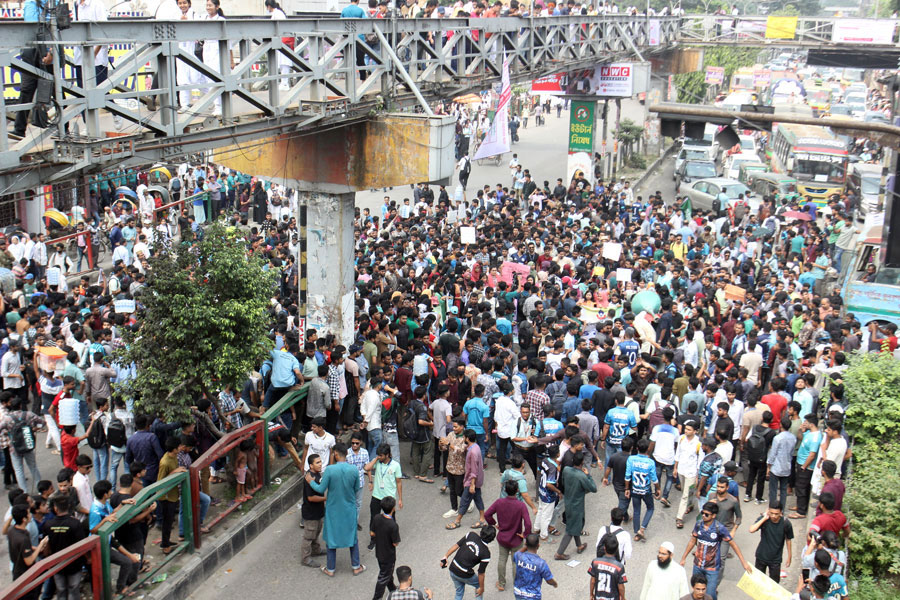
Published :
Updated :

The students of the seven colleges affiliated with Dhaka University have once again taken to the streets with a three-point demand to address their grievances. This time, central to their movement is the formation of a reform committee to establish an autonomous public university exclusively for these seven colleges. They have also called for a draft plan within 30 working days to outline the structure of this university, developed in consultation with teachers, students, and relevant stakeholders. The students are also seeking coordination with Dhaka University to ensure that the current structure remains intact until their demands are met, and to prevent any further backlogs academic years.
The seven colleges - Dhaka College, Eden Mohila College, Government Shaheed Suhrawardy College, Kabi Nazrul Government College, Begum Badrunnesa Government Mohila College, Mirpur Government Bangla College, and Government Titumir College - are some of the oldest educational institutions in Dhaka. In 2017, these colleges were affiliated with Dhaka University under a directive from former Prime Minister Sheikh Hasina, with the goal of enhancing academic standards and reducing session jams. Initially, many of the students were seen welcoming the decision with enthusiasm, believing this move would bring about positive change in their academic journey.
A few years later, however, that initial optimism has disintegrated into disillusionment and the problems these students have been facing have worsened. A four-year graduation course, for example, is now dragging on for six years/ sometimes even longer in some departments, leaving many students worried about when they will enter the job market and stand on their own feet. Protesting isn't new to them. Since the affiliation, students from these colleges have repeatedly taken to the streets to protest legitimate concerns, such as holding exams and publishing results on time. In a civilized society, it would be unthinkable that students must resort to protests to demand these basic rights.
The affiliation of the seven colleges with Dhaka University was a politically motivated decision made without prior evaluation. Evidently, Dhaka University was not equipped to handle the influx of nearly 200,000 students of the seven colleges, as it had already been struggling to provide adequate resources for its own regular students, totaling no less than 45,000.
One report estimates, to manage the administrative and exam-related tasks of the affiliated colleges, Dhaka University would require at least 250 additional administrative staff and a dedicated building. In reality, however, it received approval from the University Grants Commission to recruit only 30 staff, and the administrative work for the seven colleges is being conducted from just four rooms. It is hardly surprising, therefore, that students from the seven colleges feel neglected and discriminated against. Many say they feel they are being treated like lower category students.
One solution, which the students themselves suggest, lies in the creation of an autonomous university for the seven colleges. Professor Kamrul Hasan Mamun of Dhaka University's Physics Department has also suggested creating a collegiate university, similar to Tribhuvan University of Nepal or Calcutta University of West Bengal. A collegiate university is one where functions are divided between a central administration and several affiliated colleges.
Many countries around the world have collegiate universities, where a central administration independently oversees university operations, and the colleges functions smoothly according to their principles and guidelines. In the context of Bangladesh, if the seven colleges were separated from Dhaka University and transformed into a collegiate university system, it is believed that the quality of education in these institutions could be significantly improved. Each of the seven colleges would have its own director, with an independent central administration overseeing their management, which would foster better academic standards and governance.
Furthermore, students think, if the seven colleges are converted into a collegiate university, the faculty will have greater autonomy to develop course curriculum and improve the quality of education. This could help reduce session jam, ensure timely class, exams and results, and enable the colleges to operate more independently. By establishing separate academic boards, these colleges could complete their annual activities more efficiently.
It is high time that the authorities listen to the students and seriously consider their demands. The affiliation of the seven colleges with Dhaka University is clearly not working. Disaffiliating these colleges from Dhaka University and creating a separate collegiate university could be a win-win situation for the Dhaka University students, those of the seven colleges, and the education system overall. This would allow Dhaka University to focus and allocate more of its resources to its own students while giving the colleges the independence to manage their academic and administrative affairs more efficiently.
In a word, the plight of the students of the seven affiliated colleges must end, and, fortunately, there is a solution. They have every right to complete their higher education on time, with due process and proper standards, without being held back by bureaucratic bungling, inefficiencies, and systemic neglect.
aktuhin.fexpress@gmail.com


 For all latest news, follow The Financial Express Google News channel.
For all latest news, follow The Financial Express Google News channel.